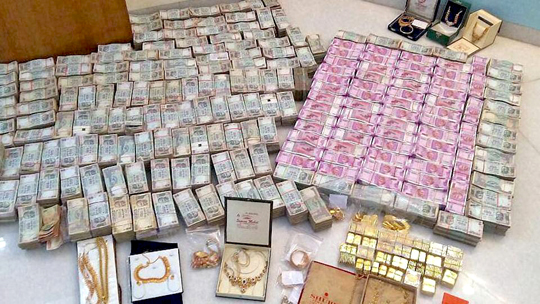Bengaluru, Feb 12: The Income Tax department on Saturday claimed to have detected undisclosed income worth Rs 120 crore and seized cash worth Rs 1.10 crore and 10 kg of gold after it conducted raids on a Congress MLA here earlier this week.

The department had been conducting searches since Thursday on multiple premises related to Hoskote MLA MTB Nagaraj as part of its investigation into alleged tax evasion charges against him and others.
"The raids conducted in the tax evasion probe case against the Congress MLA resulted in disclosure of unaccounted income exceeding Rs 120 crore. Unexplained cash worth Rs 1.10 crore and 10 kg gold have also been recovered as part of this action," officials said.
The department found that the undisclosed income was created by way of "unaccounted property investment and construction of commercial property, hospital, houses, withdrawal of bogus unsecured loans for the amount which is actually revenue receipt" and even some cash deposits made on account of renting out convention halls and paying guest accommodation.
Over 3,500 land documents indicating "land ownership" of 560 acres allegedly by the Congress lawmaker and his associates were also seized, officials said.
The searches were conducted here and in Hoskote, and have now ended.
The taxmen are also probing payments worth Rs 70 crore "received by various independent landlords" connected to the MLA and where no capital gains were paid.
Sources claimed that an instance of claiming exemption of Rs 125 crore related to "running of an SEZ" is also under the scanner of the tax department.
Attempts to get Nagaraj's comments by PTI did not fructify.
In a similar instance last month, the department had claimed to have detected undisclosed assets worth over Rs 162 crore and seized Rs 41 lakh cash, besides over a dozen kg in gold and jewellery after searches were conducted on the premises of Karnataka Minister Ramesh L Jarkiholi and Mahila Congress president Laxmi R Hebbalkar.






Comments
Public Money..
Huge money!
99.9 perent of poiticians are decoints/looters/tax thieves. They join politics only to make money. All politician properties should be investigated. Most of the policians are crorepatis with looted money.
Add new comment